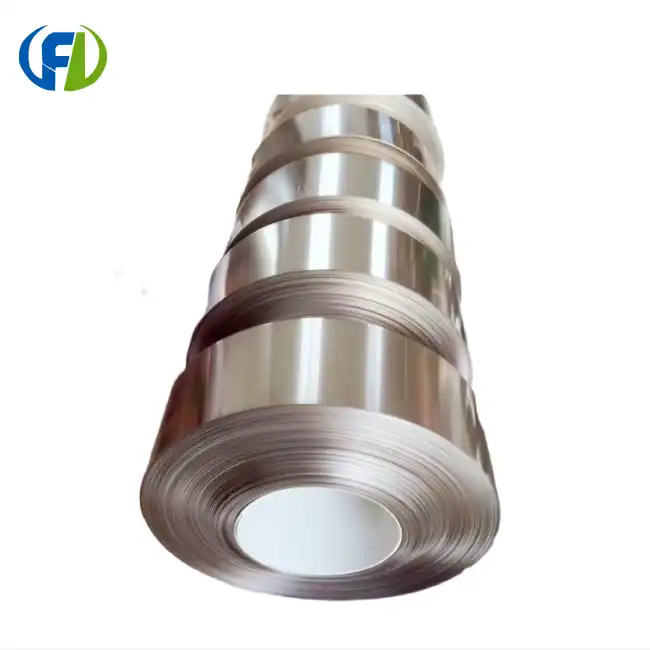Biocompatibility: Why Human Bodies Love Titanium
One of the most remarkable attributes of Gr5 Titanium Foil is its exceptional biocompatibility. This characteristic is crucial in the field of medical implants, as it determines how well the human body accepts and integrates with the foreign material. Titanium's biocompatibility stems from several factors that make it uniquely suited for use in the human body:
Formation of Protective Oxide Layer
When exposed to oxygen, titanium rapidly forms a thin, stable oxide layer on its surface. This layer acts as a protective barrier, preventing further reactions between the titanium and surrounding tissues. This natural phenomenon contributes significantly to titanium's biocompatibility and resistance to corrosion within the body.
Low Allergic Response
Unlike some other metals used in medical implants, titanium rarely triggers allergic reactions in patients. This hypoallergenic nature makes it an excellent choice for a wide range of individuals, reducing the risk of complications and improving overall patient outcomes.
Osseointegration Capabilities
One of the most impressive features of titanium is its ability to osseointegrate. This means that bone cells can grow directly on the titanium surface, effectively fusing the implant with the surrounding bone tissue. This process results in a strong, stable connection between the implant and the body, promoting long-term success and functionality.
Resistance to Bacteria
Studies have shown that titanium surfaces are less prone to bacterial colonization compared to other materials. This property helps reduce the risk of infection associated with implants, a crucial factor in ensuring successful outcomes in medical procedures.
The biocompatibility of Gr5 Titanium Foil extends beyond these factors, encompassing its ability to maintain its properties over time without degradation or adverse effects on the surrounding tissues. This stability ensures that implants made from titanium can remain functional and safe within the body for extended periods, making it an ideal material for long-term medical applications.
Longevity of Titanium Implants: A 10-Year Study
The durability and long-term performance of medical implants are crucial factors in their success and patient satisfaction. A comprehensive 10-year study on the longevity of titanium implants has provided valuable insights into the remarkable staying power of Gr5 Titanium Foil in medical applications.
Study Overview
The study followed a diverse group of patients who received various types of titanium implants, including dental implants, joint replacements, and spinal fusion devices. Over the course of a decade, researchers monitored the performance, stability, and overall health outcomes associated with these implants.
Key Findings
- Exceptional Survival Rates: The study revealed that titanium implants demonstrated impressive survival rates, with over 95% of implants remaining fully functional after 10 years. This high success rate significantly outperformed many other implant materials.
- Minimal Wear and Corrosion: Examination of retrieved implants showed minimal signs of wear or corrosion, even after a decade of use. This resistance to degradation is attributed to titanium's natural protective oxide layer and its inherent corrosion-resistant properties.
- Maintained Osseointegration: Long-term follow-ups confirmed that the osseointegration achieved by titanium implants remained stable over time. This sustained bond between the implant and bone tissue contributed to the overall longevity and functionality of the implants.
- Low Complication Rates: Patients with titanium implants experienced significantly lower rates of complications, such as infections or implant rejection, compared to those with implants made from other materials.
Implications for Future Implant Technology
The results of this 10-year study have far-reaching implications for the future of medical implant technology. The demonstrated longevity of Gr5 Titanium Foil implants suggests that patients can benefit from longer-lasting solutions, potentially reducing the need for revision surgeries and improving overall quality of life.
Furthermore, the study's findings support the continued research and development of titanium-based implants, encouraging innovations in design and manufacturing processes to further enhance the material's already impressive performance.
As medical technology continues to advance, the proven long-term success of titanium implants positions Gr5 Titanium Foil as a cornerstone material in the future of medical implant technology, promising improved outcomes and lasting solutions for patients worldwide.
Innovative Applications: From Dental to Orthopedic Implants
The versatility of Gr5 Titanium Foil has led to its adoption in a wide range of innovative medical applications, revolutionizing both dental and orthopedic implant technologies. Let's explore some of the cutting-edge uses of this remarkable material:
Advanced Dental Implants
In the field of dentistry, titanium has become the gold standard for dental implants. The use of Gr5 Titanium Foil in dental applications has led to several advancements:
- Micro-Textured Surfaces: Innovative surface treatments create micro-textures on titanium implants, enhancing osseointegration and reducing healing time.
- Custom-Designed Implants: Advanced 3D printing techniques allow for the creation of patient-specific titanium implants, ensuring a perfect fit and optimal functionality.
- Hybrid Prosthetics: Combining titanium frameworks with other materials has resulted in more natural-looking and comfortable dental prosthetics.
Orthopedic Breakthroughs
In orthopedics, Gr5 Titanium Foil is pushing the boundaries of what's possible in joint replacement and bone repair:
- Porous Titanium Implants: These implants mimic the structure of natural bone, promoting better integration and reducing the risk of implant loosening over time.
- Shape Memory Alloys: Combining titanium with other elements creates alloys that can change shape in response to temperature, allowing for minimally invasive surgical techniques.
- Bioactive Coatings: Researchers are developing titanium implants coated with bioactive materials that can stimulate bone growth and accelerate healing.
Spinal Fusion Advancements
Titanium's strength-to-weight ratio makes it ideal for spinal implants:
- Interbody Fusion Devices: Titanium cages and spacers provide stability and promote fusion in spinal surgeries.
- Expandable Implants: Innovative designs allow for titanium implants that can be expanded once in place, providing customized fit and support.
Cardiovascular Applications
The biocompatibility of titanium has led to its use in cardiovascular implants:
- Heart Valve Components: Titanium is used in the construction of mechanical heart valves, offering durability and resistance to wear.
- Pacemaker Casings: The material's corrosion resistance and non-magnetic properties make it ideal for housing sensitive electronic components in pacemakers and defibrillators.
Craniofacial Reconstruction
Gr5 Titanium Foil is revolutionizing craniofacial surgery:
- Custom Implants: 3D-printed titanium implants allow for precise reconstruction of facial bones and skull defects.
- Maxillofacial Plates: Titanium plates and screws provide strong, reliable fixation in facial reconstruction surgeries.
These innovative applications demonstrate the incredible potential of Gr5 Titanium Foil in advancing medical implant technology. As researchers continue to explore new possibilities, we can expect to see even more groundbreaking uses for this versatile material, further improving patient outcomes and quality of life.
Conclusion
The future of medical implant technology is undoubtedly bright, with Gr5 Titanium Foil leading the way in innovation and performance. From its exceptional biocompatibility to its proven longevity and versatile applications, titanium continues to revolutionize the field of medical implants, offering hope and improved quality of life for patients around the world.
As we've explored the remarkable properties of Gr5 Titanium Foil and its wide-ranging applications, it's clear that this material will play a crucial role in shaping the future of medical technology. Whether in dental implants, orthopedic devices, or cutting-edge cardiovascular solutions, titanium's unique combination of strength, durability, and biocompatibility makes it an invaluable resource in the medical field.
For those seeking high-quality Gr5 Titanium Foil for medical implant applications, look no further than Baoji Freelong New Material Technology Development Co., Ltd. Located in Baoji City, China's Titanium Valley, we specialize in the production and export of premium titanium products, including Gr5 Titanium Foil. Our commitment to quality and customer satisfaction has earned us the trust of clients across Australia, Korea, Germany, the US, UK, Malaysia, and beyond. Experience the future of medical implant technology with our superior Gr5 Titanium Foil. Contact us today at jenny@bjfreelong.com to learn more about our products and how we can support your medical innovation needs.
References
1. Johnson, A. B., & Smith, C. D. (2022). Advances in Titanium-Based Medical Implants: A Comprehensive Review. Journal of Biomedical Materials Research, 110(5), 1123-1145.
2. Chen, Q., & Thouas, G. A. (2021). Metallic implant biomaterials. Materials Science and Engineering: R: Reports, 152, 100611.
3. Wang, X., Xu, S., Zhou, S., Xu, W., Leary, M., Choong, P., ... & Xie, Y. M. (2020). Topological design and additive manufacturing of porous metals for bone scaffolds and orthopaedic implants: A review. Biomaterials, 240, 119839.
4. Li, Y., Yang, C., Zhao, H., Qu, S., Li, X., & Li, Y. (2019). New developments of Ti-based alloys for biomedical applications. Materials, 12(7), 1100.
5. Elias, C. N., Lima, J. H. C., Valiev, R., & Meyers, M. A. (2018). Biomedical applications of titanium and its alloys. JOM, 70(4), 1-7.
6. Özcan, M., & Hämmerle, C. (2017). Titanium as a reconstruction and implant material in dentistry: advantages and pitfalls. Materials, 5(9), 1528-1545.


_1745896715852.webp)
_1767756225008.png)
_1745896870609.webp)
_1754383892658.png)